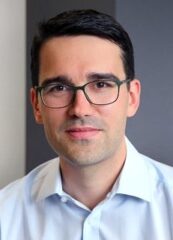Prof. Dr. Beckerle (ASM) has teamed up with international researchers to summarize the latest findings in this area of robotics – and to establish an agenda for future research.
Artificial hands are still far inferior to human ones – this is true even for those prostheses whose design is already very advanced. What they lack, and what is central to their dexterity, is the ability to feel and sense. What’s more, robotic hands have yet to successfully link the sense of touch to an action – and thus to the user. Prof. Dr. Beckerle of FAU has teamed up with international colleagues to summarize the latest findings in this area of robotics – and to establish an agenda for future research.
In the journal Science Robotics, the researchers propose a model for a robotic hand with haptic capabilities that can be controlled by sensorimotor means. The goal is to create an interface between touch and motion in a user-oriented artificial hand. The European-American research team expects this approach to produce prostheses with greater dexterity.
The sense of touch must play a central role in the future.
Philipp Beckerle’s chair is part of both the Department for Electrical Engineering and the Department for Artificial Intelligence in Biomedical Engineering. “Our mission here at ASM is to find solutions in the research of user-oriented mechatronics and robotics that combine desired performance with the most intuitive interaction possibilities possible,” Beckerle explains. “Our focus is on wearable systems such as prosthetic limbs and external skeletons, on cognitive systems such as collaborative or humanoid robots, and generally on actions that require close human-machine interaction. The human experience is crucial for all these scenarios: this is how we can meet the needs of users and achieve a synergistic connection between humans and machines.”
In addition to Prof. Beckerle, the paper involved researchers from the universities of Genoa, Pisa, Rome, Aalborg, Bangor and Pittsburgh, as well as Imperial College London and the University of Southern California, Los Angeles.

